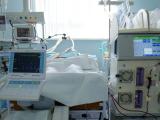Mar 30, 2007 (CIDRAP News) – A doctor who treated an Indonesian boy who died of suspected H5N1 avian influenza is now being treated for suspicious symptoms himself, according to media reports today.
The doctor had treated a 15-year-old boy who died on Mar 25 at a hospital in Bandung. Reuters reported. Indonesian officials said 3 days ago that initial tests indicated the boy had the H5N1 virus.
Yusuf Hadi, head of the bird flu department at Hasan Sadikin hospital in Bandung, told Reuters that 2 or 3 days after treating the boy, the doctor fell ill with a sore throat, fever, and respiratory symptoms, despite having worn protective equipment.
"He is in an isolation room, doing fine," Hadi told Reuters, adding that the doctor no longer has a fever.
Test results are pending for the doctor, along with three other patients, a woman and two children, Reuters reported.
By the World Health Organization (WHO) count, Indonesia has had 81 H5N1 cases with 63 deaths. But since Jan 29, Indonesia has reported at least nine cases not yet recognized by the WHO. Those include five reported this week in which further test results were awaited.
In other news, Bangladesh officials said avian flu has spread to five more farms, bringing the number to 16 in five districts, Reuters reported today. The country has culled 60,000 birds so far, the report said.
A report yesterday from Indonesia's Antara news agency said the Bangladeshi army had been called out to supervise and monitor the culling.
According to a report today from Bangladeshi officials to the World Organization for Animal Health (OIE), the country's first H5N1 outbreaks began on Feb 2 and were confirmed on Mar 22. The report, which covers the first three outbreaks, says affected birds included layer flocks on poultry farms, all in Dhaka province near the Bangladeshi capital. The source of the outbreaks is unknown.
The Asian Development Bank has been called in to help Bangladesh control the outbreaks, Reuters reported. The main laboratory at the Bangladesh Livestock Research Institute can't conduct the range of H5N1 tests, and samples need to be sent to Bangkok for confirmation, the report said.
So far, 100 poultry workers have tested negative for H5N1 infection, and 30 more from the newly affected farms are being monitored, Reuters reported. No human cases have been reported.
Meanwhile, Egypt is considering banning the trade and transport of live birds to stem the spread of avian flu. Egyptian president Hosni Mubarak sent the law to the upper house of Egypt's parliament for consideration 2 days ago, Reuters reported.
Human H5N1 cases in Egypt have surged this year, with 12 so far. The country's official WHO total stands at 29 cases, the third most, after Vietnam and Indonesia. Thirteen cases have been fatal.
















